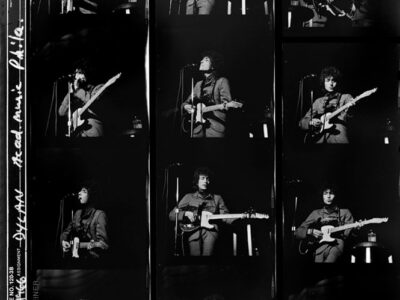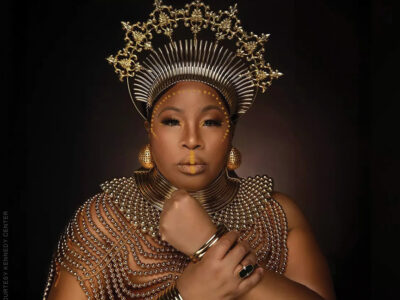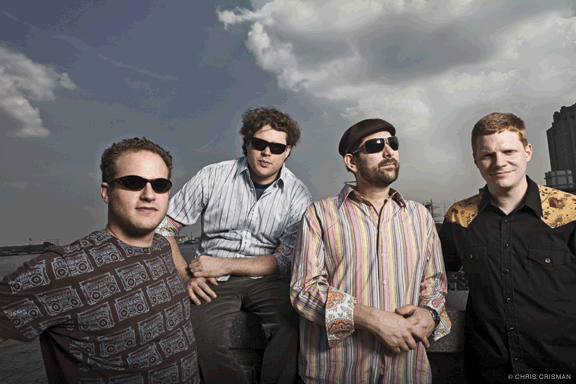
The Disco Biscuits—Penn’s own jam band of the 1990s—have a new sound (some call it Bisco), a different (and non-alumnus) drummer, and a growing fan-base (“this whole, like, people-following-us-around-the-country, circus type of thing”). Their headlining performance at this summer’s Jam on the River at Penn’s Landing may have been their most memorable ever—even if it was shut down after only 30 minutes.
By Nate Chinen | Photography by Chris Crisman
Movement is a mantra at a Disco Biscuits show. And this one—at the Highline Ballroom, a new club in Manhattan’s splashy Meatpacking District—is no exception. The floor’s packed sardine-tight, but as soon as the band starts playing, there’s an amiable tumult of bumping shoulders and bobbing heads. From the vantage of a balcony, the crowd resembles a single undulating organism. An organism mostly made up of dudes, many with baseball caps on their heads.
Before long, the opening song—a driving instrumental called “Ten Ton Foot”—melts into another tune, “World Is Spinning.” A sizeable portion of the audience seems to know the lyrics, singing along with Jon Gutwillig EAS’99, the band’s guitarist and front man. (The tone is vaguely dystopian: “Field militia, Cold War blue / Broken glass on cobbled streets / Through TV cameras straight to you.”) Then a vamp-based coda gradually assumes a reggae lilt: the setup for another song, “Mulberry’s Dream.” Eventually that morphs too, the accent shifting from upbeat to downbeat, until what’s left is a bass-thumping techno groove. The baseball caps are vigorously nodding. On the outer edges of the crowd, and in the balcony, there are some elated whirligig moves.
It’s a far cry from the house parties and frat gigs of the early ’90s, when Gutwillig first started playing with fellow Penn students Marc Brownstein, a bassist, and Sam Altman C’96, a drummer. It’s even a far cry from 1995, when keyboardist Aron Magner, also then attending the University, came aboard, and the original Disco Biscuits—named after a street term for MDMA, or Ecstasy—were complete and intact. Back then they were resolutely a jam band, with a lineage leading back to Phish and the Grateful Dead. These days the group has a new drummer, Allen Aucoin, and a signature hybrid style, “trance-fusion,” that works better than you might suspect.
One more substantial development: The band’s fan base is better suited now to cavernous arenas than low-ceilinged clubs. The Highline, with its standing capacity of 700, doesn’t begin to meet the demand, even with sold-out shows on two consecutive nights. Essentially the Biscuits are playing there as a favor to the owner, Brownstein later explains. They’re part of an inaugural spate of bookings that also includes singer-songwriter Jonatha Brooke, rapper-turned-actor Mos Def, British soul-siren Amy Winehouse, and underground-rock legend Lou Reed.
Any of those artists is likelier to turn up on a Billboard chart or in a mainstream entertainment magazine than are the Disco Biscuits, but don’t be fooled: The band’s profile, in certain circles, could hardly be bigger. And in an era when music is increasingly the domain of many interconnected pockets of consumers, that counts for an awful lot.
“When we first started the band, it really wasn’t about anything more than: ‘What’s this twist of a song about?’”Gutwillig says, a couple of days after the Highline show. “It’s hard to get back to that. It’s like, at Penn, what were we doing? I’d go to class, take some calculus exam, go hang out with everybody at Smoke’s or whatever, and then I’d go home and sit down and I’d just write a song for the hell of it. And then we’d go play it.”
He shrugs. “That was all it was. And then it turned into this whole, like, people-following-us-around-the-country, circus type of thing. It lost that [simplicity] for a little bit, because there was So Much Other Stuff Going On. And now I’m trying to boil it back down to that, but it’s really hard, because there are so many people at this point.”
Seasonally appropriate in his T-shirt, shorts, and sandals, Gutwillig is sitting on a concrete bench at Penn’s Landing, where the Disco Biscuits are about to make their fifth consecutive headlining appearance at Jam on the River. Just a few yards to his left, some hopeful freeloaders occupy an idling motorboat in the Delaware River. A stone’s throw to his right, a band called Bustle in Your Hedgerow is onstage warming up the crowd, which is gathered on the Great Plaza and already appears to be several thousand strong, with a reassuring ratio of males to females.
Gutwillig, who grew up in North Jersey, exudes the steady confidence of a lifelong honor student, though tempered with a distinctly mellow vibe. His initial major at Penn was bioengineering, but the department was in the process of shifting from one curriculum to another, and he felt caught in transitional limbo. He switched to electrical engineering, which worked out fine until the Biscuits got a record deal and went on tour. He recalls returning to campus after four months spent mostly in a van, only to discover that his advising professor had died and his lab projects had been discarded. “I had accumulated so many credits and lab hours,” he says, “I was able to get my degree anyway.”
By contrast, neither Brownstein nor Magner has yet received a Penn diploma, though their histories differ. Brownstein was a few credits shy of graduating with a degree in anthropology when both his father and grandfather died in close succession. “I sank my head into my music when that happened,” he says. “It was just too difficult to get back into the school mode.” Magner—a musical acquaintance during my own undergraduate years—was younger and not as far along in his academic career. Ultimately he and Brownstein left school for the same reason, which was the music.
And for a time, the music had to serve almost as its own reward. “It was a huge struggle for the first five years,” Brownstein attests. “It was unlike anything I would ever wish on anyone, in terms of the financial situation. But we made it through the rough part, and it’s really not a struggle anymore; it’s quite the opposite. We’re unbelievably fortunate to be in this position, where we love what we’re doing and can do it on our own terms.”
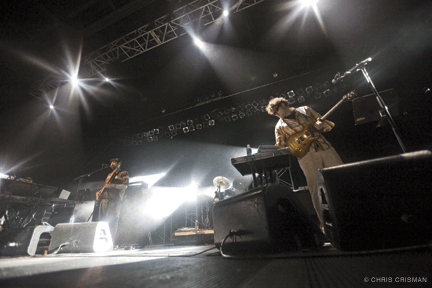
The band’s dressing room at Penn’s Landing, nestled in a bunker-like edifice, gives some indication of what those terms entail. Some coolers of beer sit in one corner, and on a table there are bottles of bourbon and vodka. More important, it seems, is the social atmosphere: Friends and girlfriends drift in and out, and Altman, who left the group in 2005 for med school at SUNY-Stonybrook, stands around cracking jokes from behind a pair of aviator shades. At one point Magner’s father, Alan, a physician and acupuncturist, pokes his head in to say hello.
But there are constant, quiet reminders of what the Biscuits are here to do. Magner has just popped open a beer when the band’s long-haired tour manager, Mike Polans, sidles up with a question: How much should they charge for posters, given that the event’s organizers are claiming a quarter of merchandising revenue? There’s some back-and-forth before a decision is made: $35 today, and maybe $30 tomorrow, at the festival after-party that the Biscuits are playing at the Electric Factory.
“We’ve always micromanaged our business, from day one, and we were always very involved with promoting ourselves,” Magner says moments later. “It’s our business, and we treat it as such. So everything gets broken down. It’s not just a touring rock band. There’s a bunch of different companies within it: the merchandise company, and the download company, and the record company.” One gets the sense that he doesn’t share Gutwillig’s slight ambivalence about the scale of the band’s success.
So how does a jam band become a trance-fusion band? “When we found our niche, which we happened to label trance-fusion, electronic music was just coming up from underground,” Magner says. “It was starting to become more prevalent in commercials and movies, though not as ubiquitous as it is now. I think it was only a matter of time before bands started figuring out how to mix electronic elements, but humanize it. We still hold true to our improvisational nature, so we have the flexibility without being confined to a sequence or a tempo. It’s taken us a while to refine that sound.”
Magner, an obsessive vintage-keyboard enthusiast, isn’t alone in recognizing an evolution. “In 1997,” explains Brownstein, “the sound had just started to develop an electronic sort of a vibe. In 1998, 1999, 2000 we were exploring it. And from 2004 to 2007, we’ve been perfecting it. So we were influenced by electronica in the late ’90s, and then we became an electronic band in the 2000s. But we retain most of the elements of our roots as we continue to develop.”
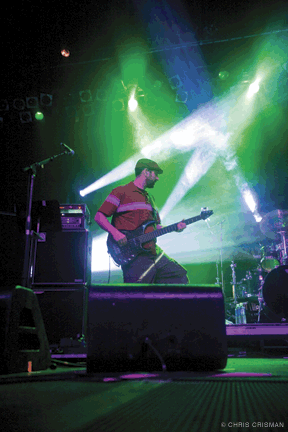
It should be noted that the electronic angle has to do with more than genre or timbre; it involves the construction of a show, which ideally should convey both the spontaneity of improvisation and the seamless flow of a good DJ set. “I’ll tell you what we’re trying to do,” Gutwillig says. “We’re trying to play one jam, one song. We’re trying to write a song, on the spot, from the beginning of the song to the end of the song. And usually with very few parts, because parts confuse the thing. But something simple, something that works, something that’s great, and something that’s complete improv on the spot.”
He adds that the Highline show, with its steady shuffle of genres, was a poor example of this almost transcendental ideal, which fans have taken to calling Bisco. “If we’re changing between feels, like from reggae to hard rock, usually it means that we don’t agree on what the song is. Somebody’s feeling the song in reggae, and somebody else is feeling it in hard rock, and the guys in the middle are going back and forth. So you have this uncertain world of the jam, and essentially somebody needs to come and rescue that jam. We try and avoid situations where jams need to be rescued. I mean, in the olden days we used to do that stuff all the time and it didn’t matter, but now we’re trying to take it to a level of, I guess you would say, sophistication.”
Not surprisingly, some of the best-loved Disco Biscuits albums are live recordings. And some of the best-loved live recordings have never been issued as albums. The wonders of digital technology have enabled the almost instantaneous availability of concert downloads, most of which are officially offered with soundboard-quality fidelity at livedownloads.com/bisco. But there are many more unauthorized recordings out there, taped and traded by fans. It’s an imperfect system, but at its core is the true conviction that the Disco Biscuits—despite the success of studio efforts like Señor Boombox, released on the Megaforce label in 2002—are generally best heard in action.
There’s a related conviction, shared by the band, that chemistry is critical. Which made it all the more difficult when Altman—tired of the grind of the road, and seeking a more grown-up ideal of stability—announced that he would be leaving in 2005. “It was a really awkward period in our lives,” Magner recalls. “It was just at that point where we opened up our eyes and realized that we obviously weren’t in college anymore. We were in our late 20s already, and we were still in this damn rock band, and now we don’t have a drummer? So it was a weird period. We kind of needed to reassess our lives, figure out in our heart of hearts whether this was what we wanted to do.” Everyone seriously considered calling it quits, he adds, only to regroup with a renewed sense of purpose.
The first order of business was finding a drummer, and not just a drummer but also someone with the potential to become a member of the family. Through an intensive process of auditions, the band went through upwards of 30 aspirants. “We had some of the most unbelievable drummers on the East Coast come and try out for us,” Brownstein recalls. “They were absolutely magnificent in their abilities, but the feel wasn’t right.” Eventually there were four finalists, who were publicly tested during a two-night run at the Borgata Casino in Atlantic City late in 2005. The event was billed as a Drum-Off. (Magner’s half-serious suggestion, to call it a Beat-Off, didn’t fly.)
Aucoin, who had been playing in an Atlanta jam band called Skydog Gypsy, proved to be the perfect fit. Having studied for a couple of years at Boston’s Berklee College of Music, he had a foundation in jazz technique as well as a grasp of rock, funk, dub, drum ’n’ bass, and techno musical styles. Brownstein and Magner both recall clicking with him from the start. Even Altman, backstage at Penn’s Landing, offers a glowing appraisal: “I feel like not only does he ‘do’ me proficiently, he’s gone far beyond anything that I’m able to play.”
Last year Aucoin was on board for some strong Bisco moments, playing to crowds of 25,000 (at the Bonnaroo Music Festival) and 20,000 (at Lollapalooza). Not that it has been smooth sailing, necessarily. “I had a lot of songs to learn,” he says, almost ruefully, of his induction into the group. “Their repertoire is humongous. I think I know about a hundred now, and I still have maybe 25, maybe 40, more to go.” His goal, he says, is to wean himself away from sheet music during shows. It hasn’t happened yet.
Onstage at the Great Plaza, the crowd is cheering Cypress Hill, a rap group best known for its pro-marijuana stance and its Top 20 single “Insane in the Brain,” which was a tireless radio staple in 1992. Backstage with the Biscuits, it’s a much more sober scene. Friends and family have been banished, and the band is mapping out a set list. Because some light equipment has been set up in the room, they’re also running down a few tunes.
One of them, “Sweating Bullets,” involves a syncopated loop that melts into a techno drone, with rippling keyboard arpeggios. (Like most of the band’s repertoire, it’s a Gutwillig original; while Brownstein and Magner each do a fair amount of writing, their songs take up a smaller share of the book.) Then there’s some talk of flirting with a cover at some point: the Guns N’ Roses power ballad “November Rain.”
“What do we have, two hours? I think we’re trying to fit in too many songs,” Magner says. “I mean, there’s gonna be a huge jam—two jams—in ‘Save the Robots.’”
Gutwillig looks up from the fretboard of his guitar. “Oh, I was thinking of trying to water down the ‘Save the Robots’ vibe a little bit. It’s a little scary.”
“We want it to be scary,” Brownstein retorts. Consensus is formed.
Polans enters, looking anxious, and informs the band that they have five minutes to get onstage. A few roadies dash in to grab the instruments. Gutwillig fires up a mist inhaler and quietly oxygenates; Magner starts jumping quickly in place, then stops.
“This band and our stupid pre-show rituals,” he quips. “Me with my jumping and you with your VapoRub.”
“This is a new one for me,” Gutwillig says. “I switched from weed to VapoRub.”
Brownstein, who doesn’t seem to have made a similar exchange, tends to his own rites of mental preparation. Aucoin sifts through a sheaf of music. A few minutes later, the band has headed to the stage, where they’re greeted with a welcoming cheer.
“Sweating Bullets” is the opener, and it delivers the right anticipatory jolt. But there’s something else in the air: an ominous gathering of cloud and wind that feels unmistakably like the onset of a storm. At the soundboard and behind the stage, people dart about with worried expressions on their faces. Across the river, the lights of Camden appear so fog-shrouded and mysterious that one roadie stops to take a picture with his cell phone.

Then it hits. Gale-force winds. Pounding sheets of rain. The storm whips over the crowd and, to an alarming extent, into the covered stage, where there are suddenly a dozen tarp-wielding crewmembers scrambling to shield the amplifiers. By this point, the band has started into “Save the Robots.” It twists around itself, the tempo drawing back for a synthesizer interlude and then speeding up for a trance breakdown. This is the band at its hypnotic and ferocious best, provoked both by the screaming crowd and the howling rain.
Nearly 10 minutes in, the song appears to come to an end, but it’s a head fake. The band shouts “Go!” and dives in again, faster and more feverishly than before. “Save the Robots” is fulfilling its destiny, sounding scary, adrenalized, intense. Aucoin slashes out a frenzied breakbeat while Magner, risking electrocution at his keyboard console, pumps a fist in the air. As if on cue, Mother Nature responds with a harder pummeling, which in turn evokes a fresh round of screams from the soaked and delirious fans.
From the rear of the stage, there’s something almost epic about the scene: It’s laughably easy to imagine the stage as a wind-tossed ship, the roadies as a desperate crew, the crowd beyond as a raging sea. The band, maniacally driven yet eerily unperturbed, could be Ahab in four pieces. (Or maybe Queequeg; it’s still hard to picture Captain Ahab naming a jam band after a party drug.) Gutwillig steps to the microphone to say that the musicians have been ordered off the stage—but then charges into “Munchkin Invasion,” which lasts a little over seven minutes before some nearby thunder-and-lightning volleys prompt park authorities to shut everything down for real.
The show has lasted just a half-hour, yielding what might be the most concentrated dose of energy in Disco Biscuits history. Weeks later, online message boards are crowded with comments like this one: “I wouldn’t trade this 30 minutes of Bisco for anything. One of the best shows I have ever seen.” Or this one: “yea this had to have been one of the craziest experiences of my life.”
Speaking by phone later in the month, Brownstein basically agrees: “I’ve never experienced anything quite like that before at a concert. Especially that ‘Save the Robots.’ That’s as good as we get.”
In some ways, the most exciting and maddening thing about the Disco Biscuits is the inconstant promise of moments like those. And as Brownstein points out, they get potentially less common as everyone grows older and starts settling down. Early in the new millennium, the band moved together to Santa Cruz, living an extension of their college years. They’re back in the Greater Philadelphia area now, and past that phase in their lives. Gutwillig lives near the Art Museum, and Magner has a house in South Philly. Brownstein resides with his wife and children in Wynnewood, on the Main Line.
But they’re also attempting to push ahead as forcefully as ever. They recently built a new studio in town, and will be recording extensively in the coming months. First, though, there’s a spate of summer festivals in Califonia, Colorado, Minnesota, and beyond. And in August there’s the sixth annual Camp Bisco, a three-day camping and music festival at the 200-acre Indian Lookout Country Club in upstate New York. Among the scheduled guest performers are King Britt, the eclectic Philly DJ; the Juan MacLean, the acclaimed techno-punk outfit; and Umphrey’s McGee, one of the better guitar-hero jam bands.
As hosts, the Disco Biscuits will naturally perform all three nights. And somewhere in the heaving crowd, someone will be praying for rain.
Nate Chinen C’98 writes about music for The New York Times. He is co-author of Myself Among Others (Da Capo), the award-winning memoir by jazz impresario George Wein.


